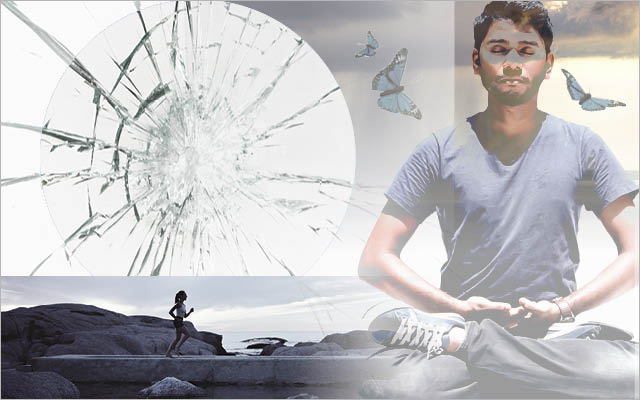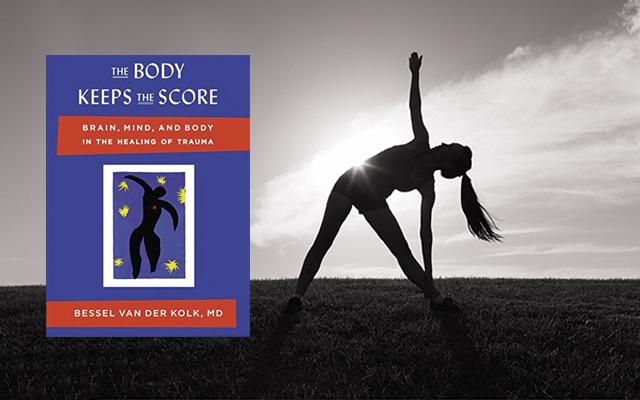Halloween 1999 was scarier for me than any holiday prior. Not for monsters or costumes or candy comas, but for the stark realization that everything — life itself — could disappear in an instant.
At the time, I was a high school senior; newly in love with a college boy, dreaming of a move and academia and dorm rooms. I was forming and evolving friendships with my classmates, working part time at the shopping mall, and loving a fresh sense of independence from having turned 18 the month before.
Going to a Halloween party with my friends seemed like a fun idea.
We socialized for a bit, and then somehow decided that cupcakes were needed. It was a garage party, I recall, complete with fog from a block of dry ice and a black light to make it extra spooky. At some point we heard “Thriller,” and then announced our temporary departure.
As I went to the car with my friend, another party-goer asked to join us and shouted, “Shotgun!” to claim the front seat. I opened the rear passenger door for myself — but she changed her mind at the last minute, deciding to stay back, so I hopped in the front seat.
After we’d bought the cupcakes, we drove back toward the party on a two-way highway. It was dark, and there were few lights along the road. A car started approaching too closely behind us, and I remember our anxiety rising. I remember my friend saying, “Back off!” as she was about to make her left turn. And I remember being blinded by the lights in the rearview mirror right before the other car made impact.
I don’t remember what costume I wore that night, but I remember that light so vividly.
The woman driving the car attempted to swerve around our vehicle on the right to avoid hitting us — but instead took out the entire back seat and the passenger side where I was sitting, forcing the rear tire forward into my seat. My seatbelt was torn and hanging together loosely. I was unconscious, but my friend was able to get out and call 911.
When my parents approached the scene, my mom later told me, she felt a deep dread in the pit of her stomach because she didn’t know if I was alive or dead. As a mother now, I can only imagine the terror and worry my parents must have had, and I understand how that sight haunts them to this day.
The police on the scene told them that anyone in the back seat would have been killed immediately.
Every Halloween night, I say a prayer for both drivers, and I thank the universe that our other friend didn’t join us — because if she had, I would’ve been sitting in that obliterated back seat.
And each Halloween, I try to minimize my feelings around that night, the aftermath of the brain surgery, and the heartbreak and frustration of the ensuing memory loss.
This 20-year anniversary felt different, though. The time span seems so long; the crash feels like yesterday in some ways, and yet also like it happened to someone else. I realized this year how much has changed, and how much I’ve learned in the years since the accident. Here are 20 insights I’ve gleaned since that fateful night.
-
The human brain is a miraculous, healing, and ever-changing organ.
For many years, scientists believed that our brain was “fixed” after childhood and eventually would decline in capability in the middle to later years of life. As the concept of neuroplasticity gained acceptance, researchers began to explore how the architecture of the adult brain can change. The most exciting research around lifestyle interventions, meditation, nutrition, and exercise gives hope to someone like me, who recovered from a traumatic brain injury (TBI), that time and the right tools can aid in healing.
-
On that TBI: The brain is still complex and unpredictable.
The days and weeks following my accident were muted, as if everyone sounded like Charlie Brown’s teacher and life moved in slow motion. While I had a scratch on my forehead, there was no pronounced bruising, so it was hard to say whether I’d hit my head on the dashboard. After multiple CT scans, a MRI revealed a subdural hematoma (a blood collection between the brain and the dura mater), which can result from a head injury strong enough to tear blood vessels. The hematoma was about the size of my hand.
The pressure on my brain was causing headaches, fogginess, and memory loss — and without intervention, it could have caused long-term health problems or a life-threatening situation. Through consultation with my neurosurgeon, I was left to consider taking a wait-and-see approach, as some subdural hematomas dissipate on their own, or to proceed with surgery.
I’ve known others who have had concussions and TBIs, and even bleeding, resolve with time and care, while some struggle for years with cognitive issues. (Learn more in “The New Science of Concussions.”) With college on the horizon, I didn’t know if I wanted to wait it out.
-
Adulthood comes with responsibilities that you may be unprepared for.
Since I was 18 at the time of my injury, the decision to undergo surgery was up to me. I come from a family of nurses on my mom’s side — our great patriarch was a surgeon (and, at 90, is still sharp as a tack) — so I have a lot of trust in medicine. My neurosurgeon, in reviewing my first CT scan on October 31, noted that there was evidence of the hematoma then, and subsequent scans showed its continued presence. I feared what would happen if I didn’t take action, so I signed the paperwork to proceed with surgery.
I hadn’t imagined that at 18 I would be signing over my life to a doctor for brain surgery. And yet, here I was.
-
Patient advocacy is crucial to better care.
My mom sat with me at all the appointments and follow-up sessions. She came with to my memory tests in the year after surgery. She took meticulous notes and kept a file with names, phone numbers, photographs of the car for insurance, and next steps for my care plan. As doctors’ appointments have become shorter and healthcare more complicated, having a friend, family member, or advocate to assist you during medical challenges can be a huge relief. They can help clarify a diagnosis and ask questions so you and your provider remain on the same page. Hiring a doula to be present during my births was instrumental in managing our fears, concerns, and stress levels. Grief counselors and hospice nurses have been so kind and helpful as family members were dying. A good care team can make a world of difference. (Read more in “The Empowered Patient.”)
-
Wear your seatbelt.
Always. No matter what. Enough said.
-
Trust your gut.
Perhaps I made poor choices that Halloween night. I didn’t need to leave the party, but I did. I generally move through life with faith and confidence versus fear and concern. I didn’t have any reason to believe something would go wrong that night.
Yet in the appointment with the neurosurgeon, my instincts told me that this surgery had to happen. There was little hesitation on my part, and I believe that it was the right choice for me. Who knows what could’ve happened if I’d waited?
-
Trauma works in mysterious ways in the brain — and in the body.
The last thing I remember from the accident was the bright lights in the mirror. Whatever protective mechanism was at work in my brain, I didn’t feel physical pain. There’s a gap in time between seeing those lights and the stark whiteness of the ER. In the interim, I heard my boyfriend’s voice saying my name, as if it were any other day when he’d call me on the phone from his dorm, and then my conscious mind heard the medical team asking me to respond. I believe I was speaking, but can’t remember what I said. I felt out of my body. Then more gaps in time before I woke up in a hospital room. The loss of memory used to infuriate me — a journalist who can’t recall all her life details! — but now I see that it was protection. My brain was shielding me from the trauma.
It was only years later, during my second birth, that I realized how I had stored that trauma away, and what actions would trigger it again.
“Trauma changes the brain. It primes survivors to perceive threats everywhere and respond as if they are in constant danger,” says Jane Clapp, a Toronto-based trauma-recovery specialist and strength-and-movement coach, in “How Movement Therapy Can Heal Traumatic Stress.” “If you feel frightened or unsafe, your brain will specialize in feelings of fear. If you feel safe and loved, your brain becomes specialized in exploration, play, and cooperation. The good news is the brain is plastic, meaning it can be changed. Learning new ways of being and new adaptive coping skills is one way to change the brain.”
-
Gratitude and self-awareness will make you a nicer person, but they are a daily practice.
It’s easy to say, “Be grateful!” but it’s another thing to actually feel gratitude. Every day, I note something that brings me joy; I look around and say, “Thank you for my breath and my life.” In my communications, I consider my responsibility for misunderstandings and the other person’s background. Being more aware of how I interact with others and the world around me has been a boon for my mental health — but it doesn’t always come without effort.
9. Don’t be a distracted driver.
Minnesota, where I live, passed a law in August that makes it illegal to hold a cell phone while driving. No texting. No scrolling your newsfeed. You can use a hands-free device, but otherwise, stay focused on the road. Which leads me to No. 10.
-
Forget what you’ve learned about how to multitask. The brain likes single tasks, and you’ll perform them better with focus.
Somewhere in the reports, it came out that the driver who’d hit us had been changing CDs. What task do you attempt while juggling another? How’s that working — or not working — for you? I understand the urge to multitask, and motherhood has me facing this conundrum often (answer an email, chop the peppers, wash the dishes, stir the sauce at the same time!), but then I start to see what’s missing when I’m not present. When I slow down and give my full attention, I feel calmer and more collected.
-
We are all flawed, and no one is infallible.
People make mistakes. Forgive yourself and one another. See how errors can create opportunities for growth (see No. 12).
-
The right lighting makes a world of difference.
The stretch of highway was very dark for a long time, and our accident wasn’t the first (or last), unfortunately. That intersection now has stoplights.
-
Cupcakes are delicious, but they aren’t always worth it.
I’m much more confident these days in being the one to pass on sweet treats, activities that don’t suit me, and trends that seem fleeting. As much as I love sugar (I am a human being), I don’t love how I feel after eating it, and that empowers me to say no more often than yes.
-
Good enough is really great.
This is still a work in progress for my perfectionist-leaning self, but I’ve come to embrace the “good-enough” mentality, which has become quite useful for the holidays. It keeps me focused on the people and conversations instead of the appearance of our surroundings.
-
Relationships will change — and that’s OK.
So much change happened during and right after my senior year, and while I attempted to return to business as usual, the surgery didn’t immediately cure my wounds and TBI. I didn’t want anyone to worry about me, or think I wasn’t “Courtney” after the accident, so I fiercely defended the status quo, including my friendships and my relationship with that college boy. We were all bound for different paths, though, and just because those relationships ended doesn’t mean I cherish those times any less. As we moved away from each other and time passed, I began to find peace in knowing that growing apart sometimes comes with growing up.
-
Our memories are unique and not always shared.
My memory (or lack thereof) of the accident is different from that of the driver of the car I was riding in — and it’s different from that of the driver of the car that hit us. It’s also different for my mom and dad. Just because we had a shared experience doesn’t mean we all have the same recollection now. This didn’t dawn on me until years later, when my younger brother shared his perspective.
-
Time heals some wounds — but it can reopen others.
Twenty years later, I sometimes feel more affected by that ominous Halloween night than I did two years after it happened. I just figured the passage of time would fade those emotions. Now that I’m a mom, I see that hardship in a new way. Finding guidance through friends, family, my spiritual advisor, and my therapist has helped me work through my feelings.
-
Let that shizz go.
Over the years, I battled against a constricting, anger-inducing energy that allowed me to believe that if I tightened my fist and tried hard enough, I could recall those memories that were missing. Letting go of what I couldn’t control was freeing (see No. 20).
-
Everything happens for a reason. Or not.
I wrestled with this sentiment a lot after the accident. People told me there was a reason for it, or that God was there for me. I was only spiritually curious at the time, so it mostly upset me to think that something bad would intentionally be part of a bigger plan. Whatever you believe, consider all the varied perspectives we have, the philosophical debates of determinism versus free will, and know that your answer may not resonate with another’s. It’s all right to see a purpose or a coincidence in both good and bad actions, Zen student. And while you meditate on that, consider No. 20.
-
You can’t control everything — or anything.
On a visit to Arizona in 2011, my grandmother drove me around and told me stories: “You remember her? You used to play at her house when you were young.” She insisted that I’d known this person, which brought me to quiet tears, and I told her that many of my memories from before the accident were blurred and unclear. What used to be lucid experiences in my mind had become simple photographs and tales that people told me about my life.
I had been so desperate to manage my recovery process that I wasn’t open to my lack of control. I was unwilling to surrender.
The day some of my memories started to return was a high point in my healing journey. I was reading an old diary from fifth grade, and the details that I’d included were lively. Suddenly, I heard my old friend’s voice and the crunch of potato chips and the sound of her laugh as we’d sit on the phone for hours watching MTV. I was flooded with a clear scene: I saw where I was sitting on the couch, saw the smears on my oversized eyeglasses, felt the softness of our dog Biff’s fur as I pet his ears. The images were outside of what was written, and I knew I was going to be OK. That my brain was going to be OK. And I wept with joy before laughing hysterically, full of all the freedom and naiveté of that sweet girl on her 18th birthday, before so much of life, in all its wildness, happened.




This Post Has 0 Comments